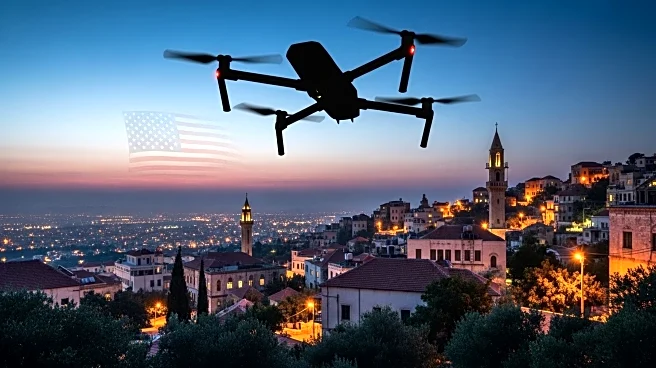What's Happening?
An Israeli drone strike in southern Lebanon has resulted in the deaths of five individuals, including three children, according to Lebanon's health ministry. Among the deceased were four U.S. citizens, as confirmed by Parliament Speaker Nabih Berri. The strike targeted a Hezbollah member operating within a civilian area, leading to civilian casualties. The Israeli Defense Forces acknowledged the incident and stated it is under review. Lebanese President Joseph Aoun condemned the attack and urged international pressure on Israel to cease such actions. The strike comes amid ongoing tensions between Hezbollah and Israel, despite a U.S.-brokered ceasefire intended to halt hostilities.
Why It's Important?
The incident underscores the fragile nature of the ceasefire between Hezbollah and Israel, highlighting the ongoing risk of civilian casualties in conflict zones. The involvement of U.S. citizens adds a layer of complexity, potentially influencing U.S. diplomatic relations and foreign policy in the region. The attack may exacerbate tensions and hinder efforts to disarm Hezbollah, as the group cites ongoing Israeli strikes as justification for retaining arms. The situation poses challenges for international peacekeeping efforts and could impact regional stability, affecting both local populations and international stakeholders.
What's Next?
Lebanese officials, including President Aoun, are likely to increase diplomatic efforts to garner international support against Israeli military actions. The incident may prompt discussions at the United Nations General Assembly, where Lebanon seeks to address the issue. The ongoing occupation of Lebanese territories by Israeli forces remains a contentious point, potentially leading to further military engagements. The review by the Israeli Defense Forces may result in changes to their operational protocols, although the broader geopolitical dynamics between Hezbollah and Israel are unlikely to shift significantly in the short term.
Beyond the Headlines
The strike raises ethical questions about military operations in civilian areas and the accountability of armed forces in conflict zones. The presence of U.S. citizens among the casualties may lead to increased scrutiny of U.S. involvement and influence in Middle Eastern conflicts. The event highlights the challenges of enforcing ceasefires and the limitations of international agreements in preventing violence. Long-term implications could include shifts in regional alliances and increased advocacy for human rights and civilian protection in conflict areas.









